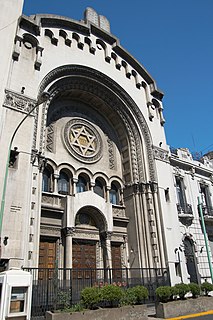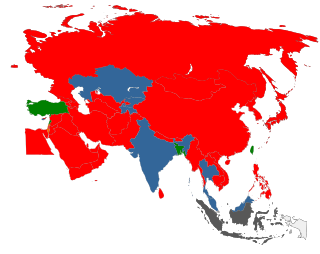Related Research Articles

Paulina Luisi (1875–1950) was a leader of the feminist movement in the country of Uruguay. In 1909, she became the first Uruguayan woman to earn a medical degree and was a firm advocate of sex education in the schools. She represented Uruguay in international women's conferences and traveled throughout Latin America and Europe. She was also the first Latin American woman to participate in the League of Nations and became one its most influential early activists. Her work has had a lasting effect on women of the Americas.

Child prostitution is prostitution involving a child, and it is a form of commercial sexual exploitation of children. The term normally refers to prostitution of a minor, or person under the legal age of consent. In most jurisdictions, child prostitution is illegal as part of general prohibition on prostitution.

Commercial sexual exploitation of children (CSEC) is a commercial transaction that involves the sexual exploitation of a child, or person under the age of consent. CSEC involves a range of abuses, including but not limited to: the prostitution of children, child pornography, stripping, erotic massage, phone sex lines, internet-based exploitation, and early forced marriage.

Zwi Migdal was an organized-crime group by Polish Jewish individuals, founded in Poland and based mainly in Argentina, that trafficked in Jewish women from Central Europe for sexual slavery and forced prostitution.

The history of the Jews in Argentina goes back to the early sixteenth century, following the Jewish expulsion from Spain. Sephardi Jews fleeing persecution immigrated with explorers and colonists to settle in what is now Argentina. In addition, many of the Portuguese traders in the Viceroyalty of the Río de la Plata were Jewish. An organized Jewish community, however, did not develop until after Argentina gained independence from Spain in 1816. By mid-century, Jews from France and other parts of Western Europe, fleeing the social and economic disruptions of revolutions, began to settle in Argentina.

Naked Tango is a 1990 erotic drama film. An Argentinean-international co-production, it was written and directed by Leonard Schrader, and stars Vincent D'Onofrio, Mathilda May, Esai Morales and Fernando Rey. The choreography was created by Carlos Rivarola.

Prostitution in Brazil is legal, in terms of exchanging sex for money, as there are no laws forbidding adults from being professional sex workers, but it is illegal to operate a brothel or to employ sex workers in any other way. Public order and vagrancy laws are used against street prostitutes. The affordability of prostitutes is the most inquired-about term in word completion queries on purchases on Google in Brazil.
Prostitution in Argentina is legal under Federal law. Article 19 of the constitution states: "The private actions of people that do not offend in any way the public order and morality, nor damage a third person, are only reserved to God, and are exempt from the authority of the magistrates." Organised prostitution is illegal. In addition, individual provinces may place further restriction on the trade. For example, in San Juan, publicly offering sex services for money is punishable by up to 20 days in jail. In 2012, newspapers were banned from carrying classified-ads offering sexual services. UNAIDS estimated there to be about 75,000 prostitutes in the country in 2016.

Prostitution in Pakistan is a taboo culture of sex-trade that exists as an open secret but illegal. Prostitution is largely based in organisational setups like brothels or furthered by individual call girls.
Prostitution in Poland is legal, but operating brothels or other forms of pimping or coercive prostitution and prostitution of minors are prohibited.

The status of women in Argentina has changed significantly following the return of democracy in 1954; and they have attained a relatively high level of equality. In the Global Gender Gap Report prepared by the World Economic Forum in 2009, Argentine women ranked 24th among 134 countries studied in terms of their access to resources and opportunities relative to men. They enjoy comparable levels of education, and somewhat higher school enrollment ratios than their male counterparts. They are well integrated in the nation's cultural and intellectual life, though less so in the nation's economy. Their economic clout in relation to men is higher than in most Latin American countries, however, and numerous Argentine women hold top posts in the Argentine corporate world; among the best known are Cris Morena, owner of the television production company by the same name, María Amalia Lacroze de Fortabat, former CEO and majority stakeholder of Loma Negra, the nation's largest cement manufacturer, and Ernestina Herrera de Noble, director of Grupo Clarín, the premier media group in Argentina.
Thailand is a centre for child sex tourism and child prostitution. Even though domestic and international authorities work to protect children from sexual abuse, the problem still persists in Thailand and many other Southeast Asian countries. Child prostitution, like other forms of child sexual abuse, not only causes death and high morbidity rates in millions of children but also violates their rights and dignity.

Petrona Eyle was an Argentine physician and feminist who campaigned for Latin American women's rights.
Human trafficking in Argentina is the illegal trade in persons for purposes of reproductive slavery, sexual exploitation, forced labor, organ removal, or any form of modern slavery.

Natasha Falle is a Canadian professor at Humber College in Toronto, Ontario, Canada, who was forcibly prostituted from the ages of 15 to 27 and now opposes prostitution in Canada. Falle grew up in a middle-class home and, when her parents divorced, her new single-parent home became unsafe, and Falle ran away from home. At the age of 15, Falle became involved in the sex industry in Calgary, Alberta.
Raquel Liberman was a Polish immigrant to Argentina, a victim of human trafficking. Her denouncement of her traffickers led to the breaking up of the Jewish human-trafficking network from Poland, Zwi Migdal, which in the early 20th century operated a worldwide white-slavery ring.

Sex trafficking in the United States is a form of human trafficking which involves reproductive slavery or commercial sexual exploitation as it occurs in the United States. Sex trafficking includes the transportation of persons by means of coercion, deception and/or force into exploitative and slavery-like conditions. It is commonly associated with organized crime.
The Ashkenazum was an organized crime group active in Argentina in the first half of the 20th century. Ashkenazum was founded by Simon Rubinstein as a splinter group from the larger Zwi Migdal, an organized crime group that stretched across five continents and specialized in the sex trafficking of Eastern European Jewish girls.
The Alfonse pogrom was a three-day riot in Warsaw, Poland. The violence led to the destruction of several dozen brothels, and to as many as 15 deaths. Accounts and analyses of the event differ with regard to its goals and participants.

The early 20th century marked a large period of immigration for Argentina. Prostitution became legalized in 1875. Moreover, due to the Great Depression, another large wave of European immigrants came to Buenos Aires looking for better job opportunities. However, there were cases about women who were tricked into coming to Argentina with the promise of a husband and better life, which turned out to be a pimp for brothels called bordellos.
References
- ↑ Bristow, Edward J. Prostitution and Prejudice: the Jewish Fight against White Slavery, 1870-1939. Schocken Books, 1983.
- ↑ Deutsch, Sandra McGee (2010). Crossing Borders, Claiming a Nation: A History of Argentine Jewish Women, 1880–1955. Durham: Duke University Press. p. 119. ISBN 978-0-8223-9260-6.
- ↑ Guy, Donna J. (1991). Sex & Danger in Buenos Aires: Prostitution, Family, and Nation in Argentina. Lincoln, Nebraska: U of Nebraska Press. pp. 120. ISBN 0-8032-7048-8.
- ↑ Vincent, Isabel. Bodies and Souls: the Tragic Plight of Three Jewish Women Forced into Prostitution in the Americas. Vintage Canada, 2007.
- ↑ Kupferboim, Rona. “Argentine Jewry's Dark Secret.” Ynet News, Jewish World, 25 May 2007.